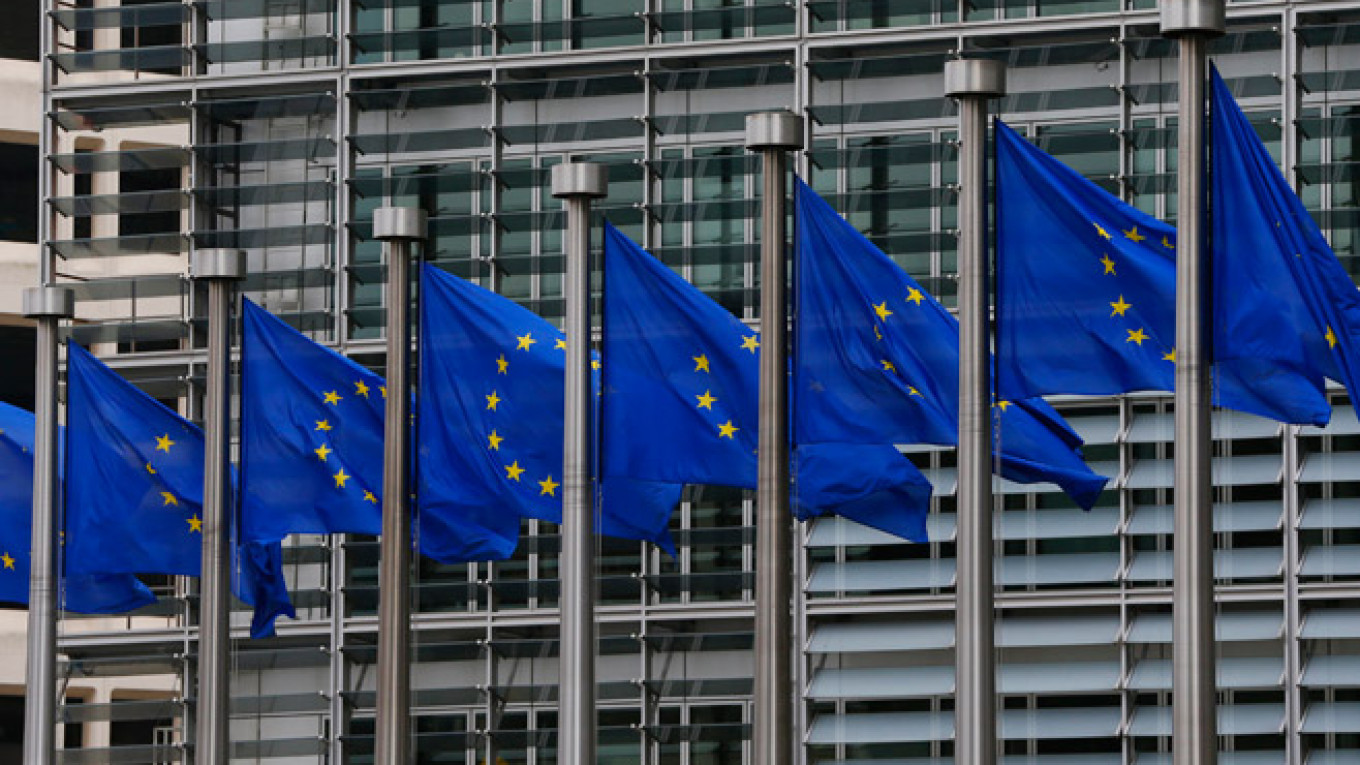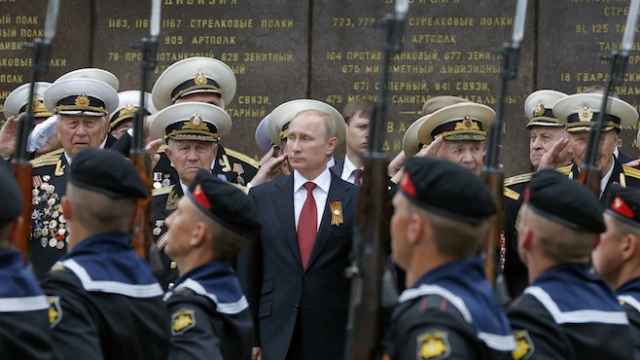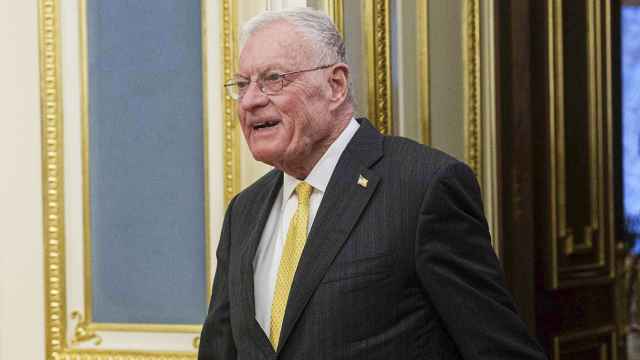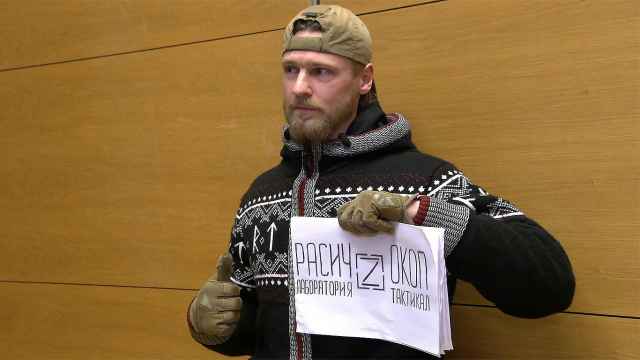The United States and European Union imposed new sanctions against Russia on Friday, tightening financial measures against Moscow over its intervention in Ukraine despite a week-old cease-fire which has brought calm to the embattled east.
The U.S. hit Russia's largest bank, a major arms maker and Arctic, deepwater and shale exploration by its biggest oil companies. The EU restricted access to financing for top Russian banks, defense and energy firms and freezing the assets of senior politicians and rebel leaders.
President Vladimir Putin called the new sanctions "a bit strange" given the truce, part of a peace deal reached last week between Kiev and pro-Russian rebels, and said he would consider retaliatory measures.
U.S. Sanctions
Washington's new sanctions target companies including Sberbank, the country's largest bank by assets, and Rostec, a conglomerate that makes everything from Kalashnikovs to cars, by limiting their ability to access the U.S. debt markets.
They will also bar U.S. companies from providing goods or services to help five Russian energy companies conduct deepwater, Arctic offshore and shale projects. The Russian companies affected are Gazprom, Gazprom Neft, LUKoil, Surgutneftegaz and Rosneft.
The sanctions seek to ban cooperation with Russian oil firms on energy technology and services by companies including Exxon Mobil and BP.
Russia is one of the world's top oil producers and is the main energy supplier to Europe. Exxon signed a $3.2 billion agreement in 2011 with Russia's Rosneft to develop the Arctic.
The U.S. Treasury Department said the sanctions include a ban on U.S. individuals or companies dealing with Rostec, a major Russian technology and defense conglomerate, in debt transactions of more than 30 days maturity.
Assets also were blocked for five state-owned defense technology firms, Dolgoprudny Research Production Enterprise, Mytishchinski Mashinostroitelny Zavod, Kalinin Machine Plant, Almaz-Antei, and NIIP.
The new sanctions also tighten the financial noose on six Russian banks, including Sberbank, by barring U.S. individuals and companies from dealing in any debt they issue of longer than 30 days maturity.
The five banks previously covered had only faced a restriction on debt maturities of more than 90 days. Like those five, Sberbank now also faces a ban on U.S. equity financing.
The Treasury Department also imposed sanctions prohibiting U.S. individuals and companies from dealing in new debt of greater than 90 days maturity issued by Russian energy companies Gazprom Neft and Transneft.
EU Sanctions
The EU's new measures put Russia's top oil producers and pipeline operators, Rosneft, Transneft and Gazprom Neft, on a list of state-owned firms whose ability to raise capital on European markets will be restricted.
EU sanctions do not include the gas sector and in particular state-owned Gazprom, the world's biggest gas producer and the biggest gas supplier to Europe.
The battle-tank maker Uralvagonzavod, the aerospace firm Oboronprom, maker of Mil military helicopters, and the state-controlled United Aircraft Corp, or UAC, which produces MiG and Sukhoi warplanes, are barred from raising new capital in Europe via securities with a maturity of more than 30 days.
The package also included asset freezes and travel bans on Igor Lebedev and other deputy speakers of the Russian lower house of parliament, on Vladimir Zhirinovsky, an outspoken nationalist politician, and on a number of leaders of pro-Russian separatists in eastern Ukraine.
Also targeted was Sergei Chemezov, described as a close associate of Putin's from his days as a KGB officer in communist East Germany. Chemezov is chairman of Rostec.
This brings the total of people under EU sanctions to 119, while 23 entities remain under asset freeze in the EU.
EU firms are also banned from providing services such as drilling and well-testing for deep water oil exploration and production, Arctic oil exploration and production, or shale oil projects in Russia.
The EU barred the export of technology that can have military uses to nine Russian firms, including Kalashnikov, maker of the famous AK-47 assault rifle.
An earlier round of EU sanctions barred EU investors from buying or selling new bonds or equity with a maturity of more than 90 days issued by major state-owned Russian banks Sberbank, VTB Bank, Gazprombank, Vneshekonombank, or VEB, and Russian Agriculture Bank, or Rosselkhozbank.
The latest measures bar trade in new securities issued by the same five banks with a maturity exceeding 30 days.
Ukraine's President Petro Poroshenko said the fresh EU sanctions highlighted the support his country was receiving: "I never felt before this level of solidarity," Poroshenko told a conference in Kiev, also citing the pledges of support he received at a NATO summit in Wales last week.
"I feel myself a full member of the European family."
Way Out
Justifying the new sanctions, the U.S. and EU say Russia has intensified its involvement in Ukraine by sending troops and arms to support pro-Russian separatists in the eastern part of the country and by shelling it across the border.
Officials in Washington and Brussels stressed that the sanctions could be removed if Russia, which denies sending troops into eastern Ukraine and arming the separatists, took a series of steps including the withdrawal of all of its forces from its neighbor.
"What we're looking for with regard to Russian action is the complete removal of all military personnel, military equipment, support for military and mercenaries on the territory of Ukraine, release of all hostages," a senior U.S. official told reporters in a conference call explaining the sanctions.
The EU has said it could lift some or even all of the sanctions within weeks — if Moscow abides by the fragile truce in Ukraine and respects a peace plan.
Russian Retaliation
President Vladimir Putin said Friday new Western sanctions against Russia looked "a bit strange," given his backing of peace efforts in eastern Ukraine, and warned that Moscow could retaliate.
"Regarding retaliatory measures, the government is thinking about them, but only those that will create better conditions for us will be applied," he said on Friday after a meeting of the Shanghai Cooperation Organization security bloc, adding that decisions would be taken carefully to avoid damaging the Russian economy.
Soon afterward, the Foreign Ministry said in an online statement: "Of course our retaliatory measures will not keep you waiting," calling the sanctions "another hostile step."
Officials have perviously talked of banning imports of cars and clothes from sanctioning countries and closing Russian airspace to Western airlines.
The ministry said the sanctions were short-sighted and would have no effect on government policy.
The Kremlin has pledged to support companies affected and on Friday Economic Development Minister Alexei Ulyukayev said Russia may divert funds from its National Wealth Fund or from pensions.
Ulyukayev also said Russia would challenge the sanctions at the World Trade Organization.
A Message from The Moscow Times:
Dear readers,
We are facing unprecedented challenges. Russia's Prosecutor General's Office has designated The Moscow Times as an "undesirable" organization, criminalizing our work and putting our staff at risk of prosecution. This follows our earlier unjust labeling as a "foreign agent."
These actions are direct attempts to silence independent journalism in Russia. The authorities claim our work "discredits the decisions of the Russian leadership." We see things differently: we strive to provide accurate, unbiased reporting on Russia.
We, the journalists of The Moscow Times, refuse to be silenced. But to continue our work, we need your help.
Your support, no matter how small, makes a world of difference. If you can, please support us monthly starting from just $2. It's quick to set up, and every contribution makes a significant impact.
By supporting The Moscow Times, you're defending open, independent journalism in the face of repression. Thank you for standing with us.
Remind me later.






